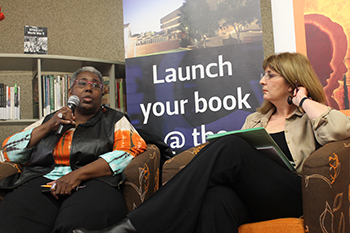Latest News Archive
Please select Category, Year, and then Month to display items
05 May 2023
|
Story EDZANI NEPHALELA
|
Photo Supplied
![]()
This audit process will assess the resources available and required for the implementation of a Language policy framework for higher education (2020) – such as the development of multilingual terminologies, translation services for teaching and learning materials, campus signage, as well as various multimedia collateral – including their quality and relevance to the needs of the students and faculty. The audit will include an assessment of existing resources and whether they are furthering implementation goals, and may also include the gathering of feedback from students and faculty to identify improvement areas.
Dr Nomalungelo Ngubane, Director of the UFS Academy for Multilingualism, said the process will help the UFS identify the essential languages resources that are available for the successful implementation of the 2020 Language Policy for Higher Education framework (LPHE). “The audit will identify how much has been done at the UFS and which institutions we can collaborate with, for example, in the development of Sesotho, so that we do not reinvent the wheel, but we close the gaps.”
Once the audit is completed, the institution will develop a plan for resource allocation to address the identified gaps. This may involve acquiring new resources, upgrading existing ones, or reallocating existing resources better to meet the needs of students, staff, and faculties.
Due to the impact this audit will have on various stakeholders, all staff and students are encouraged to participate. To attend the audit, please RSVP here by 30 May 2023.
Africa’s lost voice during the Second World War echoes throughout book
2016-08-24

Prof Judith Byfield and Prof Heidi Hudson at the
book launch of Africa and Second World War at the
UFS Sasol Library.
Photo: Rulanzen Martin
If you pick up any historical record on the Second World War, you would see that, to a large extent, Africa has been missing from the history pages until now.
Africa and the Second World War (WW II) is a book edited by Prof Carolyn Brown from Rutgers University and Prof Judith Byfield from Cornell University in the United States. The book is the outcome of various papers presented during a workshop at Rutgers University and at a conference on WWII hosted at Cornell University.
The co-editors of the book were invited by Prof Jonathan Jansen, Vice-Chancellor and Rector of the University of the Free State (UFS), to launch the book at the UFS. The Centre for Africa Studies at the university, in collaboration with the UFS Sasol Library, presented the launch on Tuesday 16 August 2016.
Bestowing honour upon Africa’s role during WW II
Many people do not know that WW II started in Ethiopia with the Italian Invasion. This is generally omitted from discussions or complete histories of WW II. The present book explores the experiences of male and female combatants, peasant producers, women traders, missionaries, and sex workers during the war. “Many people are not aware that Africa produced most of the mineral and agricultural during the war,” said Prof Brown.
Book to reach a greater audience for discussion
The co-editors hope that the book reaches people who teach WW II history, as many talk about only the nationalist movements. “The opening of the book also talks about the importance of South Africa during WW II,” said Prof Byfield. The authors hope that people will read the book to start thinking comparatively about the war.